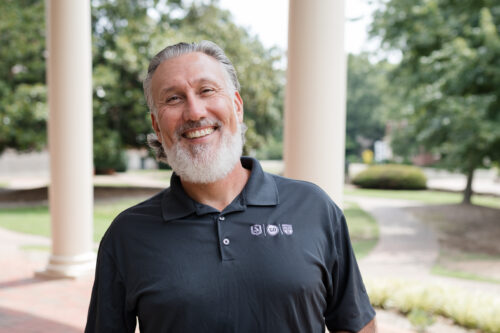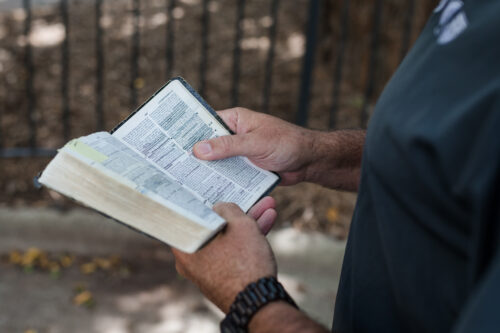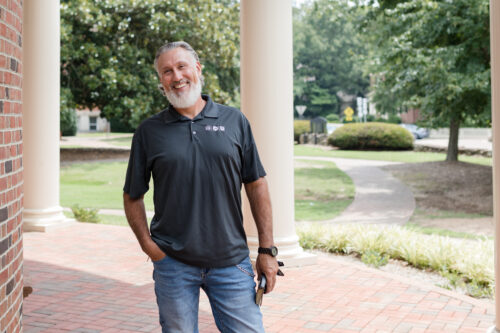Go Make Disciples: Obeying Christ, Reproducing Disciples
Chad Burchett | November 17, 2023

“People before tasks.” For George Robinson, professor of evangelism and missions at Southeastern Seminary, that mantra has oriented his life and ministry ever since he came to faith in Jesus Christ. As a former missionary with the International Mission Board (IMB), a long-time elder at his local church, and a consistent personal evangelist and disciple maker, Robinson would tell you that one of the greatest joys in his life is discipling others to live for Jesus.
Discipled by faithful friends and mentors throughout his life, Robinson is committed to pass on what God has taught him as he trains students to make disciples who make disciples.
 After his parents divorced when he was young, Robinson went to church with his grandmothers at First Baptist Church of Lawrenceville, Georgia. Although Robinson believed in God, he did not know how to have a relationship with him. Throughout high school, Robinson kept up appearances, living one way at church and another way with his friends — while occasionally trying in his own strength to fix what was wrong in his life.
After his parents divorced when he was young, Robinson went to church with his grandmothers at First Baptist Church of Lawrenceville, Georgia. Although Robinson believed in God, he did not know how to have a relationship with him. Throughout high school, Robinson kept up appearances, living one way at church and another way with his friends — while occasionally trying in his own strength to fix what was wrong in his life.
When Robinson moved to the University of Georgia for college, he walked away from the church, until his senior year when a man shared the gospel with him. Robinson rejected the message at first, but God used the man’s parting words to break down Robinson’s resistance.
“As I walked away, he said, ‘I don’t care where you’ve gone or what you’ve done; you haven’t gone beyond the love of God in Christ,’” Robinson recounted. “Those words stuck with me. As a result of that, I ended up making a phone call to the church and asked if I could come to the college ministry. I went, and a week later I was born again.”
I don’t care where you’ve gone or what you’ve done; you haven’t gone beyond the love of God in Christ.
“I realized that it wasn’t about me fixing myself, but rather, what Christ had done for me is what would reconcile me to God,” Robinson recalled.
This realization marked his new life in Christ, and Robinson began his journey of discipleship in the college ministry at his church. In his kindness, God used Ronnie, a chicken farmer in the church, to disciple Robinson, teaching him how to pray, study the Bible, and do evangelism. It was during conversations around town and on Saturday nights at Ronnie’s farm that Robinson first experienced the impact a disciple-making lifestyle can have on others.
Over the next several years, men like Ronnie, Ron Riley, and Larry Wynn invested in Robinson and taught him how to walk with God and serve others. After Robinson and his wife Catherine got married in 1996, he learned from them what it looked like to be a godly husband, and when he and Catherine started having kids, these same men modeled what it looked like to lead a family by faith.
 As he was being discipled, Robinson received practical ministry training from Larry Winn, pastor of Hebron Baptist Church, who brought him along on rides and gave him opportunities to preach and teach. In 1996, Robinson went on Hebron’s first international mission trip to Panama where God called him from teaching social studies at a public school to pursuing vocational ministry, which eventually led him to Southeastern.
As he was being discipled, Robinson received practical ministry training from Larry Winn, pastor of Hebron Baptist Church, who brought him along on rides and gave him opportunities to preach and teach. In 1996, Robinson went on Hebron’s first international mission trip to Panama where God called him from teaching social studies at a public school to pursuing vocational ministry, which eventually led him to Southeastern.
A year after Robinson and Catherine were married, they moved to Wake Forest to be a part of Southeastern’s two plus two international church planting program. During their time at Southeastern, God used the community there to continue shaping them for a lifetime of ministry.
“Professors like Keith Eitel encouraged me and gave me opportunities to teach internationally, George Braswell took me to my first mosque and showed me how to have winsome gospel conversations with Muslims, and John Hammett modeled a gracious spirit and helped me grow as a theologian,” noted Robinson. “It was also a great joy to study alongside a cohort of fellow students who shared our heart for missions. My classmates sharpened me then, and many of them still do today as we’ve stayed connected and done ministry together.”
“My first semester, Dr. Eitel invited a guest speaker to share in my intro to missions course about his ministry with the IMB in South Asia,” Robinson recalled. “The speaker, John, cast a compelling vision for the Himalayan region and the unreached people groups there. When I talked with John after class and he learned that Catherine and I were very outdoorsy, he thought we would be a perfect fit for his team.”

Through this new connection at Southeastern, Robinson stayed in touch with John as he finished his two years of coursework, and when the time came for his two-year field ministry component, Robinson and Catherine joined John’s team and deployed to an unreached people group in the western Himalayas. The combination of classroom training at Southeastern and field training under John’s leadership profoundly shaped their lives, solidifying their commitment to live on mission for Christ.
When Robinson, Catherine, and their two kids (at that time) returned to Georgia in 2000 to care for Catherine’s mom, Robinson pastored for two years before redeploying internationally with e3 Partners to start its leadership development and church planting division. Serving primarily in five different countries, Robinson wrote ministry curriculum, trained deployed missionaries, and taught national leaders reproducible church planting principles.
While God was giving him opportunities to entrust what he learned to others, Robinson was also being shaped by Christians around the world — by indigenous churches in Panama, house church planters in Peru, IMB missionaries in Bangladesh, national partners in India, and many other faithful disciple makers around the world.
“God used those experiences to give me an appreciation for what my brothers and sisters around the world could teach me as I ministered alongside them,” commented Robinson. “Shifting my understanding of mission and discipleship, those experiences forced me to stop asking the question of whether things are reproducible and start asking whether things are actually reproducing. These shifts in thinking have made a lasting impact on the way I teach discipleship to this day.”
Those experiences forced me to stop asking the question of whether things are reproducible and start asking whether things are actually reproducing.
While working and traveling with e3, Robinson earned his Doctor of Missiology from Western Seminary, further developing his practice of missions and discipleship. Around that time, Robinson was also serving intentionally in Atlanta, discipling several young men to live on mission for Christ.
At Robinson’s encouragement, several of the men he was discipling moved to Southeastern for ministry training, and through them, Robinson connected with some of the administration at Southeastern, eventually joining the faculty in 2008.
 “I’m now in my sixteenth year on faculty, and it has been a joy and a blessing to teach here,” commented Robinson. “As I arrived in 2008, Dr. Akin was really shaping the ethos of Southeastern as a Great Commission seminary with a focus on disciple making. That was also my heartbeat, and it still is. It’s hard to get unfocused at a Great Commission seminary. The leadership at Southeastern is focused on that mission and supportive of the work that I do to train disciple makers.”
“I’m now in my sixteenth year on faculty, and it has been a joy and a blessing to teach here,” commented Robinson. “As I arrived in 2008, Dr. Akin was really shaping the ethos of Southeastern as a Great Commission seminary with a focus on disciple making. That was also my heartbeat, and it still is. It’s hard to get unfocused at a Great Commission seminary. The leadership at Southeastern is focused on that mission and supportive of the work that I do to train disciple makers.”
“In the classroom, I teach students to make reproducing disciples,” added Robinson. “I teach evangelism, discipleship and disciple making, and international church planting, which all hinge on making disciples who make disciples. That is an absolute passion of mine.”
When Robinson and his family moved to Wake Forest, they joined North Wake Church where a couple of the young men he had discipled were members. In God’s providence, Robinson was able to continue discipling them not only at the church but also at the seminary. For Robinson, his roles at the church and the seminary were fundamentally the same: making disciples who make disciples.
Robinson served as an elder at North Wake for more than a decade and has regularly led small groups and helped coach missionaries from the church as they prepare to deploy. Whether equipping students at Southeastern, discipling younger men in his life, or training missionaries at North Wake, Robinson stewards these relationships to encourage others toward greater faithfulness to Christ.
“My primary role is being an encourager — a Barnabas — and a coach to these men and women,” shared Robinson. “I want to help them think through their ministries and strategies, speaking into their blind spots and helping them to sharpen their focus or increase their faithfulness. What fills my tank is investing in people — discipling, coaching, and mentoring relationships.”
What fills my tank is investing in people — discipling, coaching, and mentoring relationships.
For the last six years, Robinson has helped coach a discipleship and ministry coalition called No Place Left that one of the men Robinson discipled started in the Raleigh-Durham area. He also stays connected with IMB missionaries and their families, coaching and encouraging them in their ministries. Driven by a desire to encourage disciple makers, Robinson hopes to use his sabbatical next year to coach missionaries deploying to North Africa, the Middle East, and southern Europe.
 At the end of the day, putting people first — discipling them to love and obey Jesus — is what life is all about for Robinson. As Robinson reminds his students at Southeastern, that means teaching others to practice what Jesus teaches in the power of the Spirit.
At the end of the day, putting people first — discipling them to love and obey Jesus — is what life is all about for Robinson. As Robinson reminds his students at Southeastern, that means teaching others to practice what Jesus teaches in the power of the Spirit.
“The big thing is obedience-oriented disciple making,” noted Robinson. “People need to put things into practice as they learn them, rather than just piling knowledge upon knowledge. The fundamentals are the basic commands of Jesus, and the goal is making disciples who embrace and obey those commands through the indwelling Holy Spirit, who is at work within them to love what Jesus loves and do what Jesus did. That’s what I’m after in my classes, and that’s why I deeply enjoy investing in my students’ lives.”
Would you join us in praying for the ministries of the men and women Dr. Robinson has discipled and for Dr. Robinson to be strengthened in his efforts to make disciples who make disciples?